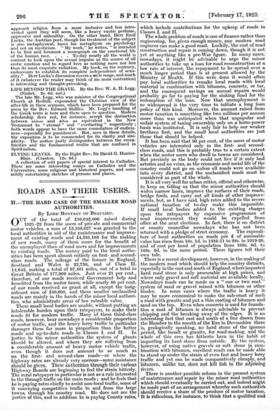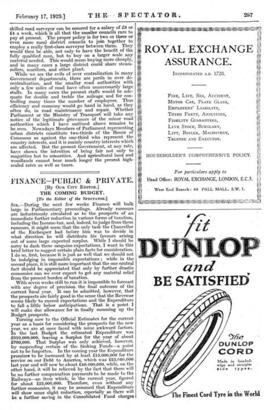ROADS AND THEIR USERS.
II.—THE HARD CASE OF THE SMALLER ROAD AUTHORITIES.
By LORD MONTAGU OF BEAULIEU.
OUT of the total of £10,042,000 raised during 1921-22 from the users of private and commercial motor vehicles, a sum of £5,108,027 was granted to the local authorities in aid of the maintenance and improve- ment of existing roads and £4,531,108 for the making of new roads, many of them more for the benefit of the unemployed than of road users and for improvements to existing roads. The money paid to the local autho- rities has been spent almost entirely on first- and second- class roads. The mileage of the former in England, Scotland and Wales is 22,756, and of Class II. 14,645, making a total of 87,401 miles, out of a total in Great Britain of 177,809 miles. Just over 21 per cent., therefore, of our roads received Government help and benefited from the motor taxes, while nearly 80 per cent. of our roads received no grant at all, except the insig- nificant sum of £40,000, and these smaller unclassified roads are mainly in the hands of the minor local authori- ties, who administrate areas of low rateable value.
These small local bodies are unable, without putting an intolerable burden upon their ratepayers, to make their roads fit for modern traffic. Many of these third-class roads, however, bear nowadays a considerable proportion of motor traffic, and the heavy lorry traffic in particular damages them far -more in proportion than the better made and up-to-date roads in Classes I. and IL In justice to the minor authorities the system of giants should be altered, and where they are suffering from a considerable amount of heavy motor vehicle traffic, even though it dOes not' amount to 'as much as on the first- and second-class roads—or where the highway rates are already very onerous—some assistance should 'be given. These authorities through their various Highway Boards are beginning to feel the strain bitterly. The rural ratepayer in particular is not as a rule interested in the through traffic on the main roads ; and he feels that he is paying rates chiefly to assist non-local traffic, some of it conveying competitive traffic, to and from the large towns, through his country road. He does not see the justice of this, and in addition he is paying County rates, which include contributions for the upkeep of roads in Classes I. and II.
The whole problem of roads is one of finance rather than engineering, for, given enough money, any modem road engineer can make a good road. Luckily, the cost of road construction and repair is coming down, though it is not yet at anything like a pre-War figure. In many cases,' nowadays, it might be advisable to urge the minor authorities to take up a loan for road reconstruction at a low rate of interest, the repayment to be spread over a much longer period than is at present allowed by the- Ministry of Health. If this were done it would often pay local authorities to remake local roads with local material in combination with bitumen, concrete, or tar, and the consequent savings on annual repairs would probably go far to paying for the sinking fund for the redemption of the loan. Now that unemployment is so widespread is the very time to initiate a long loan policy of this kind. Moreover, the amount raised from motor taxation is something like two millions per annum more than was anticipated when that unpopular and unfair system of taxing ownership only on a horse-power basis was instituted. It is only fair to help our weaker brethren first, and the small local authorities are just those that should be helped. It has been said that 90 per cent. of the users of motor vehicles are interested only in the first- and second- class roads, and this is probably true to a certain extent when the motor users who dwell in towns are considered. But precisely as the body could not live if it only had arteries and no veins, so the economic and social life of the country could not go on unless all roads were available- into every district, and the unclassified roads must be considered as part of the Whole. It is all very well for urban critics, official and otherwise, to keep on telling us that the minor authorities should widen narrow lanes, improve the surfaces of their roads, bridge fords, and carry out all kinds of other improve- ments, but, as I have said, high rates added to the severe national taxation of to-day make this impossible. If small local bodies added to the existing charges upon the ratepayers by expensive programmes of road improvement they would be expelled from office at the next elections. Iii fact, there is no district or county councillor nowadays who has not been returned with a pledge of strict economy. The expendi- ture of local authorities on roads per £ of assessable value has risen from 18s. id. in 1910-11 to 28s. in 1919-20, and of cost per head of population from 103s. 6d. to 168s. 3d. in the same period. These figures tell their own tale.
There is a recent development, however, in the making of the modern road which should help the country districts, especially in the east and south of England, where imported hard road stone is only procurable at high prices, and where only gravel and soft material are available locally. Nowadays roads can be made on a " one or two coat ' system of sand or gravel mixed with bitumen or other binder. In some cases where the traffic is heavy it may be more economical to make the sub-crust of such a road with granite and put a thin coating of bitumen and sand on the top. Even when concrete is used for founda- tion a coat of bitumen is always advisable to prevent chipping and the breaking away of the edges. It is an interesting fact that east and south of a line drawn from the Humber to the mouth of the Exe in Devonshire there is, geologically speaking, no hard stone of the igneous period, like basalt or granite, for road-making, and the whole of this area has hitherto been in the habit of importing its hard stone from outside. By the system, however, of using native gravels or soft stone in com- bination with bitumen, excellent roads can be made able to stand up under the strain of even fast and heavy lorry traffic and yet can be made comparatively cheaply, and bitumen, unlike tar, does not kill fish in the adjoining rivers.
There is another possible reform in the present system of maintenance and repair by the minor road authorities which should eventually be carried out, and indeed might be made part of an arrangement whereby such authorities should receive a share of the produce of motor taxation. It is ridiculous, for instance, to think that a qualified and skilled road surveyor can be seeured- for a salary of £8 or £4 a week, which is all that the smaller councils care to pay at present. The proper policy is for two or three or even more rural district councils to join together to employ a really first-class surveyor between them. They would then be able, not only to have the benefit of the fully qualified man, but to buy on a larger scale any material needed. This would mean buying more cheaply, and in many cases a large district could share steam- rollers, scarifiers, and other plant. While we see the evils of over centralization in many Government' departments, there are perils in over de- centralization, mid the smaller road authorities with only a few miles of road have often unnecessarily large staffs. In many cases the present staffs would be ade- quate for double and treble the mileage_ and for con- trolling many times the number of employees. Thus efficiency and economy would go hand in hand, as they often do, in road maintenance and repair. Whether Parliament or the Ministry of Transport will take any ' notice of the legitimate grievances of the minor road authorities which I have outlined above remains to be seen. Nowadays Members of Parliament representing urban districts constitute two-thirds of the House of Commons as against the one-third who represent the country interests, and it is mainly country interests which are affected. But the present Government, at any rate, have shown the intention of being fair not only to majorities but to minorities. And agricultural land and woodlands cannot bear much longer the, present high- scaled rates as well as taxes.











































 Previous page
Previous page